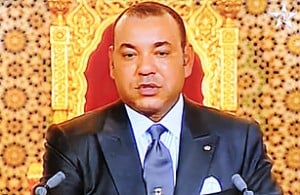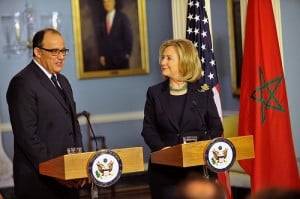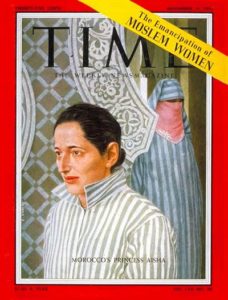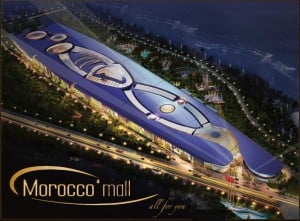2011 has been a year filled with change, reform, progress and challenges across the Middle East and North Africa, Morocco included. As we anticipate what 2012 holds for the region, here’s a recap of key moments in 2011 for Morocco:
February 20 – Thousands demonstrated across Morocco in solidarity with protesters in Egypt and Tunisia, as well as to call for an acceleration of reforms in Morocco. The demonstrations were called for by the Freedom and Democracy Now movement, which used Facebook and other social media to mobilize followers. This date became the name of the protest movement that later challenged the democratic reform process. The group was handicapped by inconsistent messaging, internal disputes and, in the end, a refusal to participate in consultations for the proposed constitutional reforms.
 March 9 – King Mohammed VI addresses the nation and calls for unprecedented reforms to the Constitution. He assembles a consultative constitutional commission, made up of academics, policymakers, civil society and political party leaders, trade unions and youth and charges the group with drafting the reformed Constitution.
March 9 – King Mohammed VI addresses the nation and calls for unprecedented reforms to the Constitution. He assembles a consultative constitutional commission, made up of academics, policymakers, civil society and political party leaders, trade unions and youth and charges the group with drafting the reformed Constitution.
March 19 – Morocco, represented by Foreign Minister Taieb Fassi Fihri and Prime Minister Abbas El Fassi, participated in the high-level International Conference in support of the new Libya, co-chaired by French President Nicolas Sarkozy and British Prime Minister David Cameron. Morocco pledged to “support the Libyan brotherly people at the multilateral level, notably within the UN, so that Libya can regain its stature among nations through its legitimate representatives from the National Transitional Council (NTC).”
 March 23 – Morocco’s Foreign Minister, Taieb Fassi Fihri, visited the US to meet with Secretary of State Hillary Rodham Clinton. (Minister Fassi Fihri was the first Arab foreign minister to visit the US since the beginning of the Arab Spring.) During the visit, Minister Fassi Fihri and his US counterpart discussed strengthening bilateral relations through a strategic partnership, reiterated the US and Moroccan commitment to resolving the Western Sahara conflict through autonomy for the disputed territory under Moroccan sovereignty and pledged to work together to promote stability in the region, particularly as conditions worsened in Libya.
March 23 – Morocco’s Foreign Minister, Taieb Fassi Fihri, visited the US to meet with Secretary of State Hillary Rodham Clinton. (Minister Fassi Fihri was the first Arab foreign minister to visit the US since the beginning of the Arab Spring.) During the visit, Minister Fassi Fihri and his US counterpart discussed strengthening bilateral relations through a strategic partnership, reiterated the US and Moroccan commitment to resolving the Western Sahara conflict through autonomy for the disputed territory under Moroccan sovereignty and pledged to work together to promote stability in the region, particularly as conditions worsened in Libya.
April 28 – A young Moroccan man, dressed as a “Western Hippie,” walked into Cafe Argana, very popular among tourists and Moroccans, in Marrakesh’s Jamaa el Fna square (which is a UNESCO World Heritage site), left a suitcase filled with explosives and remote detonated the device. Seventeen people, Moroccans and European tourists, were killed and injured more than 20 others. Moroccan authorities claim that those responsible for the bombing were linked with al-Qaeda in the Islamic Maghreb (AQIM), though AQIM denied responsibility. In late October, the alleged mastermind of the attacks, Adel al-Othmani, was convicted and sentenced to death and his co-conspirators received sentences ranging from two years to life.
June 17 – In a speech to the nation, King Mohammed VI announces historic reforms to the Constitution presented to him by the consultative commission. Among the reforms: the role of Prime Minister is greatly enhanced and the King must appoint the Prime Minister from the party which wins the most seats in the elections, stronger mechanisms for the promotion and protection of women’s equality, human rights, recognition of Amazigh (Berber) as an official language, the King must make key appointments in consultation with the Prime Minister and the Cabinet and the judiciary is restructured to increase independence and transparency.
July 1 – The proposed reforms are put to a national referendum. Voter turnout is 73% and 98% vote in favor of the reforms.
 September 4 – Princess Lalla Aicha, sister of the late King Hassan II and aunt of King Mohammed VI, died at the age of 81 in Rabat. Lalla Aicha was the first female Arab Ambassador (United Kingdom, 1965-69) and was very active throughout her life as a women’s rights activist and vocal advocate for the Red Crescent.
September 4 – Princess Lalla Aicha, sister of the late King Hassan II and aunt of King Mohammed VI, died at the age of 81 in Rabat. Lalla Aicha was the first female Arab Ambassador (United Kingdom, 1965-69) and was very active throughout her life as a women’s rights activist and vocal advocate for the Red Crescent.
October 21 – Morocco is elected to a two year term as a non-permanent member of the UN Security Council for 2012-13.
October 22 – Three European aid workers were kidnapped by members of AQIM from within the Polisario-controlled refugee camps in Tindouf, Algeria. The Polisario Front, whose members reportedly assisted the kidnappers, currently challenges Morocco’s sovereignty over the disputed Western Sahara.
November 25 – Morocco holds first parliamentary elections since the adoption of broad constitutional reforms approved by referendum in July. The elections were also the first parliamentary elections in the region since the Arab Spring began. (Egypt’s parliamentary elections began the following Monday and the Tunisian elections which preceded Morocco’s were to choose a constituent assembly to write the country’s new constitution.) Voter turnout was 45%, up from 37% for the 2007 national Parliamentary elections. The winning party in the elections were the moderate Islamist party, the Party of Justice and Development (PJD), which won 107 of the 395 seats in the Lower House of Parliament. Shy of a majority, the PJD was required to form a governing coalition with other major parties.
November 29 – King Mohammed VI appoints Abdelilah Benkirane, leader of the Islamist Party of Justice and Development as Prime Minister of the newly elected parliament.
 December 2 – “Morocco Mall” in Casablanca, the largest shopping mall in Africa, opens its doors. The opening of the $260 million project brought drew Moroccan royalty, Princess Lalla Meryem (the sister of King Mohammed VI) and American pop culture royalty, Jennifer Lopez.
December 2 – “Morocco Mall” in Casablanca, the largest shopping mall in Africa, opens its doors. The opening of the $260 million project brought drew Moroccan royalty, Princess Lalla Meryem (the sister of King Mohammed VI) and American pop culture royalty, Jennifer Lopez.
December 23 – President Obama signs the 2012 Consolidated Appropriations Act (Omnibus) for which Congress’ report language, for the first time, authorizes US assistance monies to be used in all regions of Morocco, included the Moroccan-administered Western Sahara. Congress also called on the State Department to make resolving the Western Sahara conflict a “ priority.”